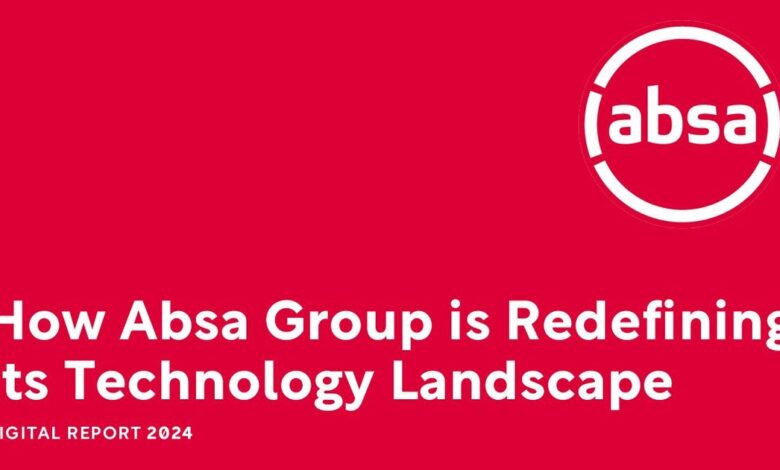How Absa Group is Redefining its Technology Landscape

As one of Africa’s largest financial services providers, Absa Group offers an extensive range of banking and financial products and services to individuals, businesses and other institutions across the continent.
Its growth in recent years has been both exponential and international. In addition to its 10 offices in Africa, including headquarters in Johannesburg, South Africa, these days Absa has locations in New York, London and, more recently, in China.
To truly understand this expansion, one must look back to 2005, when UK banking giant Barclays acquired the business. As part of the deal, Absa absorbed several banks across Africa, which it retained when Barclays divested and began selling most of its shares throughout the 2010s.
By 2018, Barclays’ ownership had been reduced to just 15% and, in 2022, the organisation sold its remaining stake in Absa – signalling a major rebrand.
“After Barclays divested and sold most of its shares in Absa, we retained all branches across Africa as part of the sell-down,” explains Loredana Renzi, Market Risk COO at Absa Group.
“Our roots have always been deeply South African. However, as we embarked on redefining our mission and purpose, we recognised the importance of embracing a Pan-African perspective. That’s why we landed on ’empowering Africa’s tomorrow, together – one story at a time’ as our mission statement. It reflects our commitment to collaborating across the continent, leveraging diverse stories and experiences to drive positive change and empower the future of Africa.”
Internal evolution crucial to progression
While Absa’s separation from Barclays has had its complications over a prolonged period, Renzi reveals it has also served as a “fantastic opportunity” to redefine the bank.
A significant element of this involved rebuilding its systems, transitioning away from Barclays processes and redefining the Absa landscape.
This rebuilding phase has not only allowed Absa to regain control over its operations, but has also enabled the implementation of more tailored and efficient banking systems.
By customising its infrastructure to suit its specific needs, Absa has enhanced its agility and responsiveness to market demands.
Simultaneously, Absa has strategically positioned itself as a prominent player in the Pan-African landscape, solidifying its presence in the market.
Renzi says: “It was almost like starting a new bank with access to startup funds, because, through the divestment, we managed to secure quite a good investment which allowed us to rebuild and redefine ourselves.”
From a strategic perspective, the focus during Renzi’s decade at Absa – especially in recent years – has been on transformation and innovation.
“We’re focused on enhancing operational efficiencies by implementing streamlined systems and processes, while simultaneously striving to create added value for our customers,” she continues.
Absa’s market risk leader also points to internal evolution as being crucial to the company’s progression.
Renzi admits that, when she arrived, Absa didn’t necessarily have a reputation within the sector for being a good place to work. Today, this couldn’t be further from the truth. In February 2024, Forbes recognised Absa as the top employer in South Africa, positioning it at number 103 globally in its rankings.
“We’ve really changed perceptions over the last 10 years,” Renzi adds. “I feel quite passionate about the journey we’ve been on.”
Absa’s digital transformation focus
As Renzi has already touched upon, Absa’s separation from Barclays has given the business the opportunity to invest in modernising its technology infrastructure and digital capabilities.
Broadly speaking, this has involved upgrading core banking systems, enhancing digital channels and platforms, and implementing innovative fintech solutions to improve customer experience, streamline processes and drive operational efficiency.
What’s more, from a transformation perspective, a decision was taken by Absa to build its own proprietary risk and pricing engines, as opposed to delving into the market for vendor solutions.
Partnerships have, however, been formed with vendors in other areas of digital transformation such as cloud computing, where moving to AWS helped streamline various processes. In fact, the whole technology landscape has been simplified thanks to a process of decommissioning numerous systems that were no longer useful.
Advanced data analytics were utilised as well, predominantly in a bid to build a deeper pool of information on customers and enhance their experience.
“I remember thinking one of the big advantages we had over other banks in South Africa, following that separation from Barclays, was the ability for us to go and redefine our technology landscape,” Renzi shares.
“If you look at some of the other institutions, they have a lot of systems and solutions in place for very small, similar outputs. You’ll find they’re product-centric, whereas we’ve tried to move to a more customer-centric focus.
“You could have a bank account, a home loan, a vehicle loan and an investment account with the same bank, but four different platforms to manage them. Our customer focus means you can log into your profile and you’ve got everything there together.”
Meeting regulatory requirements
Renzi’s day job has, over the past five years, been dominated by the implementation of the Fundamental Review of the Trading Book (FRTB), a set of international rules governing market risk in the banking sector.
Proposed by the Basel Committee on Banking Supervision, these regulations aim to enhance risk management practices and ensure greater stability in the financial system.
FRTB was initially earmarked to ‘go live’ at the end of 2019, but has repeatedly been pushed back. As it stands, financial institutions based in South Africa will need to begin complying with the revised framework from 1 July 2025, while other jurisdictions have until 2026.
In the lead-up, a significant amount of preparation work has been taking place behind the scenes at Absa, including the creation of a new market risk calculation and reporting engine designed to comply with the regulatory standards.
A crucial milestone in this process is the commencement of a year-long parallel run, which is due to begin in July 2024 and is necessary for securing regulatory approval.
Renzi explains: “We’ve been hard at work developing new reporting metrics and establishing the necessary infrastructure and capabilities for generating the metrics and reports as required by the South African regulator.
“We started the project in 2019, which included a migration of our value-at-risk (VaR) engine.”
VaR is a vital metric for assessing risk within Absa’s trading book, as well as exposures crucial for internal risk management and regulatory reporting purposes in compliance with the current regulatory framework.
Looking ahead, Renzi anticipates changes with the implementation of FRTB: “In approximately a year’s time, as we transition to FRTB, the VaR calculation will no longer be mandatory for regulatory compliance. We will, however, continue to utilise it for risk management purposes.
“We’ll be using the FRTB Standardised Approach for our regulatory capital reporting, which is more of a sensitivity-based risk management approach.”
Building its own functionality
One of many areas where Absa has been excelling in recent years is in the development of its own functionality.
This is being achieved through a fruitful combination of in-house development and strategic partnerships with technology vendors and fintech firms.
It’s a hybrid approach that is allowing Absa to leverage internal expertise while bringing in external resources to create effective solutions.
Renzi once again references the decision taken by the organisation to invest in building its own risk and pricing engines, adding: “Building proprietary technology solutions and functionality internally to address our individual and specific business needs is really important to us.
“With the risk and pricing system, we felt like we had the expertise internally rather than externally, although we did bring in consultants to bolster some of the teams and get the work over the line.
“But, from an in-house perspective, we like to run and drive all of the projects ourselves. We want to give our colleagues the opportunity to work on these projects and develop their skills as opposed to bringing in consultants to do all the work.”
Renzi is, however, keen to praise the tech vendors, fintech firms and consulting giants – such as Deloitte and PwC – who are all too happy to offer up their industry knowledge, experience and expertise when required.
“We can’t execute this level of work without our strategic partners,” she continues. “For instance, we collaborate extensively with Deloitte due to their deep experience and expertise in the regulatory domain.
“Our strategic partnerships allow us to accelerate the development and implementation of cutting-edge technology and innovative solutions ensuring alignment with regulatory standards. Additionally, they provide access to industry best practices, offering invaluable insights and knowledge.”
Executing the strategy
Looking ahead, chief among Renzi’s aims for the next couple of years in her market risk role is to obtain regulatory approval in relation to the FRTB and the continued delivery of regulatory-based projects. Recently, she has taken on the implementation of the new Initial Margin Requirements which will come into effect in September 2025 for Absa Group.
But from a company-wide perspective, Absa is focusing on executing an out-performance strategy for 2024 to 2026 which is underpinned by sustainable growth, innovation, value creation and becoming more competitive in the market.
Renzi admits to being just a single – albeit important – cog in the vast machine that is working hard to achieve these goals through countless transformation programmes.
“We’re deeply committed to developing and deploying the right tools, systems, and processes to drive business growth and outperformance,” she concludes. “For me personally, it’s about consistently tackling challenges head-on, devising effective solutions, ensuring regulatory compliance and delivering comprehensive analytics and insights to enable informed decision-making within our business.”
**************
Make sure you check out the latest edition of FinTech Magazine and also sign up to our global conference series – FinTech LIVE 2024
**************
FinTech Magazine is a BizClik brand



